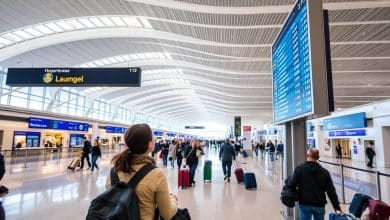Travel Hacks for Long International Flights: Save Money, Space, and Time
Crossing continents doesn’t have to drain your wallet or energy. Industry experts call flight optimization “a precise science”, blending strategy with insider know-how to unlock hidden savings. This approach transforms how adventurers approach lengthy trips, turning sky-high expenses into manageable investments for unforgettable experiences.
Savvy explorers focus on more than just ticket prices. Timing departure dates, selecting alternate routes, and leveraging loyalty programs create a ripple effect of benefits. These methods help stretch budgets further while prioritizing comfort during 10+ hour trips.
Common hurdles like cramped seating and layover chaos become solvable puzzles. Simple adjustments—from seat selection tricks to packing formulas—can preserve both personal space and sanity. Frequent Nigeria-based flyers report saving up to 40% on Lagos-to-London routes using these techniques.
The real win? Redirecting saved funds toward cultural immersions and premium upgrades. Imagine swapping airport lounge fees for a guided tour of Marrakech’s markets or extra nights in a Zanzibar beach villa. Strategic planning makes these trade-offs possible without sacrificing reliability.
Understanding Travel Hacking Basics
Smart explorers know airfare discounts aren’t accidental. They’re the result of decoding airline pricing systems through what experts call “strategic navigation”. This method transforms overwhelming price charts into clear pathways for savings, especially for routes like Lagos to Johannesburg.
What Is Travel Hacking?
It’s a systematic way to uncover hidden discounts by studying airline patterns. Instead of random searches, practitioners analyze how carriers adjust prices based on demand, seasonality, and competitor moves. One Nigerian frequent flyer saved ₦150,000 on Dubai trips by tracking midweek price drops.
Core Principles of Finding Cheap Flights
Flexibility reigns supreme. Shifting departure dates by 48 hours often reveals lower fares. Consider alternate airports—Abuja instead of Kano, for example—to access better deals.
Timing matters. Airlines update prices every Tuesday afternoon in West Africa. Monitoring these windows helps catch sudden discounts. Combine this with loyalty points from local bank cards for stacked savings.
Advanced tools simplify the process. Price-tracking apps highlight fare trends, while multi-city search options expose budget-friendly routing combinations. As one aviation analyst notes: “The lowest price isn’t always the most obvious route.”
Timing is Everything for Flight Booking
Booking flights at the right moment can unlock savings that go beyond simple discounts. Airlines recalibrate prices based on demand spikes and competitor moves, creating fleeting windows for budget-conscious flyers. Savvy planners use calendar patterns and billing cycles to stretch their naira further.
Best Times of the Month to Book Flights
Align purchases with credit card billing cycles. A Lagos-based finance advisor notes: “Scheduling bookings after the 28th gives nearly 60 days to settle balances interest-free.” This tactic works particularly well for routes like Abuja to Istanbul, where fares often dip in late-month sales cycles.
Historical data reveals consistent price drops 3-8 weeks before departure. Travelers targeting Johannesburg from Nigeria save 22% on average by booking during this window. Price-tracking tools help identify these sweet spots across different carriers.
Midweek Booking Advantages
Tuesday through Thursday bookings yield lower fares as airlines adjust prices to fill seats. FareCompare.com’s research shows Wednesday at 3PM ET (8PM Nigerian time) as the golden hour for deals. Leisure travelers’ weekend searches drive up Friday-Monday rates, making midweek purchases strategic.
Seasonal awareness amplifies savings. Avoiding December holiday rushes on Lagos-New York routes can cut costs by ₦85,000. One frequent flyer reported securing Dubai trips for 40% less by combining midweek timing with off-peak travel months.
Leveraging Off-Peak Travel and Layovers
Smart timing transforms layovers from hassles into hidden opportunities. Airlines reward those who fly when others won’t—think Saturday nights or sunrise departures. These periods see empty seats and eager carriers willing to slash prices.
Identifying Off-Peak Flight Times
Red-eye flights and early morning departures often cost 30% less than midday options. Most people avoid these times, creating surplus inventory. A Lagos-based flight analyst notes: “Carriers drop prices dramatically when departure times clash with sleep schedules or weekend plans.”
Saturday evenings show similar patterns. Business travelers rarely fly then, leaving seats open for bargain hunters. Check routes like Accra to Frankfurt—late Saturday departures frequently undercut weekday fares.
Maximizing Long Layovers for Perks
Six-hour waits become sightseeing adventures through airport programs. Dubai International offers free tours to transit passengers, while Icelandair lets travelers pause up to seven days in Reykjavík at no extra cost. Always ask about layover deals when booking.
Overnight stops? Some airlines provide discounted hotel stays. Emirates often covers accommodation for connections exceeding eight hours. This way, a mandatory break becomes a mini-vacation en route to your final destination.
Strategic layovers add value without raising costs. They’re not just a way to save—they’re an advantage for explorers craving extra cultural stamps in their passports.
Smart Use of Flight Search Engines
Navigating the maze of online flight searches requires more than a quick Google query—it demands strategy. Each platform operates like a unique treasure map, revealing different routes to savings through specialized algorithms and partnerships. Savvy explorers treat these tools as complementary allies rather than interchangeable options.
Comparing Aggregator Sites
Not all search engines dig equally deep. Google Flights shines with its Explore map, visually displaying budget-friendly destinations from Lagos or Abuja. Momondo scours hundreds of smaller agencies, often finding fares 15% lower than mainstream sites. “The best deals hide in niche platforms most travelers never check,” notes a Nairobi-based travel analyst.
Kayak’s price alerts outperform others for West African routes, while Skyscanner’s flexible date grid exposes midweek bargains. Orbitz bundles hotels with flights, ideal for last-minute planners. Testing multiple sites takes minutes but can save ₦50,000+ on long-haul trips.
Benefits of Using Multiple Platforms
Cross-checking three sites minimum prevents missed opportunities. A Johannesburg-bound traveler might find Emirates tickets cheaper on CheapOair than Airfarewatchdog. Airline partnerships vary by platform—some prioritize local carriers like Ethiopian Airlines or Kenya Airways.
Enable private browsing when comparing prices. Though cookie-based price hikes are rare, some sites track repeat searches. Rotate between devices or browsers for clean comparisons without historical data influencing results.
This multi-tool approach transforms overwhelming choices into actionable intel. Combine Google’s speed, Momondo’s depth, and Skyscanner’s flexibility to outsmart dynamic pricing models.
How to Use the 24-Hour Rule and Price Alerts
Savvy flyers have a secret weapon against buyer’s remorse and shifting airfares. The US Department of Transportation’s 24-hour rule acts as a safety net for those booking trips involving American airports. This regulation lets travelers lock in prices while keeping options open.
Locking in a Fare with the 24-Hour Rule
When securing a ticket to New York from Lagos, the clock starts ticking immediately. Airlines must allow free cancellations or changes within 24 hours if booked at least seven days before departure. “It’s like test-driving a fare,” explains a Lagos-based travel agent. Use this window to confirm visas, hotel availability, or competing prices.
Online agencies often extend this policy. Priceline and Expedia sometimes offer 24-hour holds without payment. Combine this with price alerts on Google Flights or Hopper for real-time updates. One Abuja traveler saved ₦45,000 by rebooking the same flight after an alert showed a midday price drop.
Set alerts across three platforms minimum. Track routes like Lagos-Houston for 14 days to spot patterns. When a desirable price appears, book immediately. If a better deal emerges within 24 hours, cancel the original booking fee-free. This strategy removes the pressure of perfect timing while guarding against sudden fare hikes.
Finding Hidden Flight Deals Through Multi-City Options
Breaking free from traditional roundtrip thinking opens new savings frontiers. Multi-stop itineraries let explorers craft personalized routes while dodging premium pricing. Airlines increasingly reward flexible planners with under-the-radar discounts on complex bookings.
Open-Jaw Ticket Tactics
Flying into Lagos but departing from Accra? Open-jaw tickets solve this puzzle. These bookings separate arrival and departure cities, often costing less than standard returns. A Nigerian traveler recently saved ₦78,000 on a Europe trip by landing in Paris and returning from Rome.
Budget carriers like Wizz Air now offer one-way options at 55% of roundtrip prices. Pair these with local airlines for island-hopping adventures. “Flying Aegean Airlines to Athens, then switching to Sky Express for Santorini cuts costs by 40%,” notes a Lagos-based tour operator.
Strategic Stopover Planning
Multi-city searches transform layovers into exploration opportunities. Emirates allows 3-stop itineraries from Abuja to Bangkok with Dubai and Colombo pauses at no extra cost. Each break becomes a mini-trip within the journey.
Key strategies for Nigerian flyers:
- Compare one-way prices across 3+ airlines
- Use Google Flights’ multi-city map tool
- Book long-haul and regional carriers separately
This approach turns rigid schedules into adaptable adventures. Travelers gain control over their routes while keeping budgets firmly grounded.
Tips for Searching Alternative Airports and Routes
Airports often hold secret pathways to savings most travelers overlook. Expanding search parameters beyond obvious hubs reveals pricing patterns airlines don’t advertise. A Lagos-based explorer recently saved ₦210,000 by flying through Hong Kong to Bali instead of booking direct—proving creativity beats convenience.
Evaluating Nearby Airport Options
Secondary airports frequently offer lower fees than major hubs. For Nigeria departures, consider Accra or Cotonou instead of Lagos. “Regional terminals compete fiercely,” notes an aviation analyst. “Their discounts sometimes cover ground transportation costs twice over.”
Check routes like Abuja-Shanghai versus Port Harcourt-Singapore. Tax differences alone can slash ₦55,000 off fares. Flight comparison tools now let users search multiple departure points simultaneously—a game-changer for flexible planners.
Using Connecting Flights to Save Money
Strategic layovers turn budget constraints into adventures. Book separate tickets through Asian hubs for 60% savings on Australia trips. Example:
- Lagos → Hong Kong (₦450,000)
- Hong Kong → Sydney (₦180,000)
Key tactics for Nigerian travelers:
- Research which airports offer cheapest connections
- Compare one-stop versus multi-city pricing
- Verify visa requirements for transit countries
Major carriers like Qatar Airways often price-match split itineraries when asked. This approach transforms rigid routes into customizable journeys while keeping funds available for authentic cultural experiences.
Travel Hacks for International Flights
Seasoned globetrotters know the real savings lie beyond basic booking tactics. Mastering regional networks and pricing quirks turns ordinary trips into budget-friendly journeys. One Abuja-based explorer recently sliced ₦120,000 off a Tokyo trip by combining Emirates’ long-haul service with Peach Aviation’s domestic Japanese routes.
Insider Strategies from Frequent Fliers
Communities like FlyerTalk reveal unadvertised deals. A Lagos traveler snagged Nairobi-Dubai tickets for ₦65,000 using an Ethiopian Airlines pricing error shared in forums. “Carriers rarely publicize these glitches,” notes a frequent flyer. “But alert communities pounce within hours.”
The skiplagged approach works cautiously. Booking Lagos→Johannesburg→Cape Town as a single ticket might let you exit at JNB. Warning: checked bags go to the final destination, and airlines may penalize repeat offenders.
Leveraging Local Carrier Deals
Regional airlines offer golden connections. After flying Qatar Airways to Doha, switch to SalamAir for Oman trips at 60% less than direct fares. Nigerian explorers use this method for Asian adventures:
- Turkish Airlines to Istanbul + AirAsia to Bali
- Emirates to Dubai + Flydubai to Baku
Timing matters. Air Peace’s midweek Lagos-Accra flights drop 35% during rainy seasons. Pair these with Ethiopian Airlines’ Africa network for seamless continent-hopping.
Maximizing Benefits with Credit Cards and Loyalty Programs
Financial tools become jet fuel for explorers when used strategically. Premium cards like American Express Platinum transform everyday spending into airport lounge access and accelerated rewards. A Lagos-based banker shares: “My signup bonus covered 80% of a Nairobi trip—just by timing card applications with major purchases.”
Choosing the Right Travel Credit Card
Prioritize cards offering 30,000-50,000 mile welcome bonuses. These often cover roundtrip fares from Lagos to Dubai when redeemed through partner airlines. Key features to compare:
- TSA Pre-Check/Global Entry fee credits
- Priority boarding privileges
- 3x points on dining and fuel purchases
Nigerian cardholders report recouping annual fees through free checked bags alone. One user saved ₦240,000 yearly on British Airways flights using an Iberia-linked Visa card.
Understanding Frequent Flier Alliances
Three global networks multiply rewards:
- Star Alliance: Connects United Airlines with 26 carriers
- OneWorld: Links Qatar Airways to 13 partners
- SkyTeam: Powers Delta/Aero Contractors collaborations
A loyalty program manager advises: “Focus on one alliance. Nigerian travelers gain elite status faster through SkyTeam’s African routes.” This strategy unlocks lounge access and bonus miles across multiple airlines.
Responsible use matters. Pay balances monthly to avoid interest eroding rewards. Pair cards with alliance-focused spending to turn routine expenses into upgraded adventures.
Packing and Baggage
Efficient packing transforms luggage from a burden into a strategic asset. Seasoned explorers treat their suitcases like 3D puzzles—every item must serve multiple purposes. Compression cubes organize Ankara fabrics that double as beach cover-ups and souvenir wrappers, while rolled clothing prevents wrinkles better than folding.
Weight distribution matters. Place heavier items near wheels to prevent suitcase tip-overs during airport sprints. Nigerian travelers often pack empty reusable bags—they collapse flat but expand for market finds or sudden purchases.
Baggage fee avoidance starts with airline policy mastery. Check carrier websites 72 hours pre-departure—weight limits change frequently. A Lagos frequent flyer saved ₦18,000 annually by splitting items between checked and carry-on using precise digital scales.
Tech tools simplify compliance. AirTag trackers help locate delayed luggage, while apps like PackPoint generate customized lists based on destination weather. Pair these with durable luggage brands like Safari for stress-free journeys across continents.
FAQ
What is travel hacking?
When is the cheapest time to book a flight?
How can layovers save money on flights?
Which flight search engines are most reliable?
What is the 24-hour rule for bookings?
How do multi-city tickets reduce costs?
Why check nearby airports for savings?
Which credit cards offer the best travel perks?
How to avoid checked baggage fees?
What are frequent flier alliances?
Published on: 28 de July de 2025

Abiade Martin
Abiade Martin, author of WallStreetBusiness.blog, is a mathematics graduate with a specialization in financial markets. Known for his love of pets and his passion for sharing knowledge, Abiade created the site to provide valuable insights into the complexities of the financial world. His approachable style and dedication to helping others make informed financial decisions make his work accessible to all, whether they're new to finance or seasoned investors.






